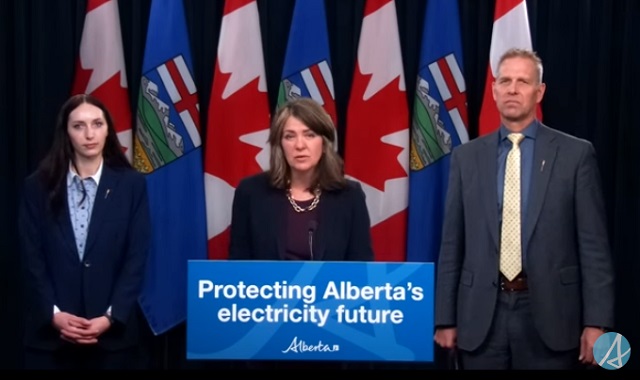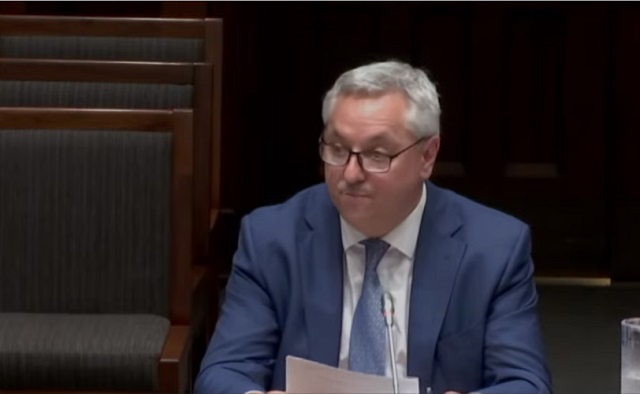Business
Monogram Coffee & #CommunityOverCOVID – Calgary Supports Local

As the COVID-19 crisis continues to sweep the nation and the globe, companies across Canada have continued to respond with a number of initiatives designed to support essential workers and foster community connection. There have been countless supply donations for hospitals, free meal initiatives for healthcare workers and long-distance truckers, local support movements in solidarity with local business owners, and more. The individual and corporate responses to the impacts of the virus have been something of a sunbeam during these strange and uncertain times.
As a result, social media has seen a surge in locally-based community trends and hashtags such as #SupportLocal, #ThankATrucker and #CommunityOverCOVID. There have been countless heartwarming stories surrounding local businesses and the people of Calgary – but what does it really mean to support one another in the face of COVID-19? What is #CommunityOverCOVID?
Jeremy Ho, Cofounder of Monogram Coffee, shares the impact of COVID-19 on their day-to-day operations and thanks the people of Calgary for coming together to continue their support.
Since the launch of their original Altadore location in 2015, Monogram has been committed to serving the Calgary community through coffee and has always placed the wellbeing of their customers and team at the forefront. That’s why, in an early effort to minimize the risk of COVID-19, all three Monogram Coffee locations were some of the first businesses in the city to close their doors.
Monogram transitioned to online alternatives with free shipping options as a way to remain connected with the community while putting public health and safety first. The public response to this adjustment has been overwhelmingly positive, according to Ho. “People appreciate still being able to get the coffee they love, delivered directly to their homes.”
Not only have people continued to buy Monogram coffee online, the shop’s email and social platforms have been continually flooded with notes of encouragement and thanks. “Customers have also been purchasing gift cards,” says Ho, “as their way of saying ‘don’t worry, we will come back when this is over’”.
Grateful for the sense of community and determined to give back, Monogram Coffee launched an initiative at the beginning of April to provide frontline workers with free coffee. Relying on a public nomination system, Monogram has sent coffee to hundreds of workers around the city as their way of saying thanks. “This is beyond coffee, food, anything,” says Ho, “We have to stay together as a community and make an effort to support each other, our workers, and all our great local businesses.”
Monogram Coffee’s story is just one of many others like it. In Calgary, during these strange times, #CommunityOverCOVID is an entire city coming together to look after its most vulnerable members. It is loyalty and love between businesses and customers, it is personalized thank you notes on every take-out order and signs of support in front windows, it is donations to hospitals and essential workers. It is stories like this one that highlight Calgary’s character and reminds us that as long as we look after one another, things will be okay again.
Alberta
Alberta government should create flat 8% personal and business income tax rate in Alberta

From the Fraser Institute
By Tegan Hill
If the Smith government reversed the 2015 personal income tax rate increases and instituted a flat 8 per cent tax rate, it would help restore Alberta’s position as one of the lowest tax jurisdictions in North America
Over the past decade, Alberta has gone from one of the most competitive tax jurisdictions in North America to one of the least competitive. And while the Smith government has promised to create a new 8 per cent tax bracket on personal income below $60,000, it simply isn’t enough to restore Alberta’s tax competitiveness. Instead, the government should institute a flat 8 per cent personal and business income tax rate.
Back in 2014, Alberta had a single 10 per cent personal and business income tax rate. As a result, it had the lowest top combined (federal and provincial/state) personal income tax rate and business income tax rate in North America. This was a powerful advantage that made Alberta an attractive place to start a business, work and invest.
In 2015, however, the provincial NDP government replaced the single personal income tax rate of 10 percent with a five-bracket system including a top rate of 15 per cent, so today Alberta has the 10th-highest personal income tax rate in North America. The government also increased Alberta’s 10 per cent business income tax rate to 12 per cent (although in 2019 the Kenney government began reducing the rate to today’s 8 per cent).
If the Smith government reversed the 2015 personal income tax rate increases and instituted a flat 8 per cent tax rate, it would help restore Alberta’s position as one of the lowest tax jurisdictions in North America, all while saving Alberta taxpayers $1,573 (on average) annually.
And a truly integrated flat tax system would not only apply a uniform tax 8 per cent rate to all sources of income (including personal and business), it would eliminate tax credits, deductions and exemptions, which reduce the cost of investments in certain areas, increasing the relative cost of investment in others. As a result, resources may go to areas where they are not most productive, leading to a less efficient allocation of resources than if these tax incentives did not exist.
Put differently, tax incentives can artificially change the relative attractiveness of goods and services leading to sub-optimal allocation. A flat tax system would not only improve tax efficiency by reducing these tax-based economic distortions, it would also reduce administration costs (expenses incurred by governments due to tax collection and enforcement regulations) and compliance costs (expenses incurred by individuals and businesses to comply with tax regulations).
Finally, a flat tax system would also help avoid negative incentives that come with a progressive marginal tax system. Currently, Albertans are taxed at higher rates as their income increases, which can discourage additional work, savings and investment. A flat tax system would maintain “progressivity” as the proportion of taxes paid would still increase with income, but minimize the disincentive to work more and earn more (increasing savings and investment) because Albertans would face the same tax rate regardless of how their income increases. In sum, flat tax systems encourage stronger economic growth, higher tax revenues and a more robust economy.
To stimulate strong economic growth and leave more money in the pockets of Albertans, the Smith government should go beyond its current commitment to create a new tax bracket on income under $60,000 and institute a flat 8 per cent personal and business income tax rate.
Author:
Business
Maxime Bernier warns Canadians of Trudeau’s plan to implement WEF global tax regime

From LifeSiteNews
If ‘the idea of a global corporate tax becomes normalized, we may eventually see other agreements to impose other taxes, on carbon, airfare, or who knows what.’
People’s Party of Canada leader Maxime Bernier has warned that the Liberal government’s push for World Economic Forum (WEF) “Global Tax” scheme should concern Canadians.
According to Canada’s 2024 Budget, Prime Minister Justin Trudeau is working to pass the WEF’s Global Minimum Tax Act which will mandate that multinational companies pay a minimum tax rate of 15 percent.
“Canadians should be very concerned, for several reasons,” People’s Party leader Maxime Bernier told LifeSiteNews, in response to the proposal.
“First, the WEF is a globalist institution that actively campaigns for the establishment of a world government and for the adoption of socialist, authoritarian, and reactionary anti-growth policies across the world,” he explained. “Any proposal they make is very likely not in the interest of Canadians.”
“Second, this minimum tax on multinationals is a way to insidiously build support for a global harmonized tax regime that will lower tax competition between countries, and therefore ensure that taxes can stay higher everywhere,” he continued.
“Canada reaffirms its commitment to Pillar One and will continue to work diligently to finalize a multilateral treaty and bring the new system into effect as soon as a critical mass of countries is willing,” the budget stated.
“However, in view of consecutive delays internationally in implementing the multilateral treaty, Canada cannot continue to wait before taking action,” it continued.
The Trudeau government also announced it would be implementing “Pillar Two,” which aims to establish a global minimum corporate tax rate.
“Pillar Two of the plan is a global minimum tax regime to ensure that large multinational corporations are subject to a minimum effective tax rate of 15 per cent on their profits wherever they do business,” the Liberals explained.
“The federal government is moving ahead with legislation to implement the regime in Canada, following consultations last summer on draft legislative proposals for the new Global Minimum Tax Act,” it continued.
According to the budget, Trudeau promised to introduce the new legislation in Parliament soon.
The global tax was first proposed by Secretary-General of Amnesty International at the WEF meeting in Davos this January.
“Let’s start taxing carbon…[but] not just carbon tax,” the head of Amnesty International, Agnes Callamard, said during a panel discussion.
According to the WEF, the tax, proposed by the Organization for Economic Co-operation and Development (OECD), “imposes a minimum effective rate of 15% on corporate profits.”
Following the meeting, 140 countries, including Canada, pledged to impose the tax.
While a tax on large corporations does not necessarily sound unethical, implementing a global tax appears to be just the first step in the WEF’s globalization plan by undermining the sovereignty of nations.
While Bernier explained that multinationals should pay taxes, he argued it is the role of each country to determine what those taxes are.
“The logic of pressuring countries with low taxes to raise them is that it lessens fiscal competition and makes it then less costly and easier for countries with higher taxes to keep them high,” he said.
Bernier pointed out that competition is good since it “forces everyone to get better and more efficient.”
“In the end, we all end up paying for taxes, even those paid by multinationals, as it causes them to raise prices and transfer the cost of taxes to consumers,” he warned.
Bernier further explained that the new tax could be a first step “toward the implementation of global taxes by the United Nations or some of its agencies, with the cooperation of globalist governments like Trudeau’s willing to cede our sovereignty to these international organizations.”
“Just like ‘temporary taxes’ (like the income tax adopted during WWI) tend to become permanent, ‘minimum taxes’ tend to be raised,” he warned. “And if the idea of a global corporate tax becomes normalized, we may eventually see other agreements to impose other taxes, on carbon, airfare, or who knows what.”
Trudeau’s involvement in the WEF’s plan should not be surprising considering his current environmental goals – which are in lockstep with the United Nations’ 2030 Agenda for Sustainable Development – which include the phasing out coal-fired power plants, reducing fertilizer usage, and curbing natural gas use over the coming decades.
The reduction and eventual elimination of so-called “fossil fuels” and a transition to unreliable “green” energy has also been pushed by the World Economic Forum – the aforementioned group famous for its socialist “Great Reset” agenda – in which Trudeau and some of his cabinet are involved.
-

 Brownstone Institute2 days ago
Brownstone Institute2 days agoPfizer Lied to Us Again
-

 Brownstone Institute2 days ago
Brownstone Institute2 days agoDid Lockdowns Set a Global Revolt in Motion?
-

 Frontier Centre for Public Policy1 day ago
Frontier Centre for Public Policy1 day agoThe tale of two teachers
-

 Business22 hours ago
Business22 hours agoMaxime Bernier warns Canadians of Trudeau’s plan to implement WEF global tax regime
-

 COVID-1916 hours ago
COVID-1916 hours agoWHO Official Admits the Truth About Passports
-

 International12 hours ago
International12 hours agoUN attacks stay-at-home motherhood as ‘gender inequality’
-

 Brownstone Institute2 days ago
Brownstone Institute2 days agoIs the Overton Window Real, Imagined, or Constructed?
-

 Alberta12 hours ago
Alberta12 hours agoProvince to stop municipalities overcharging on utility bills









